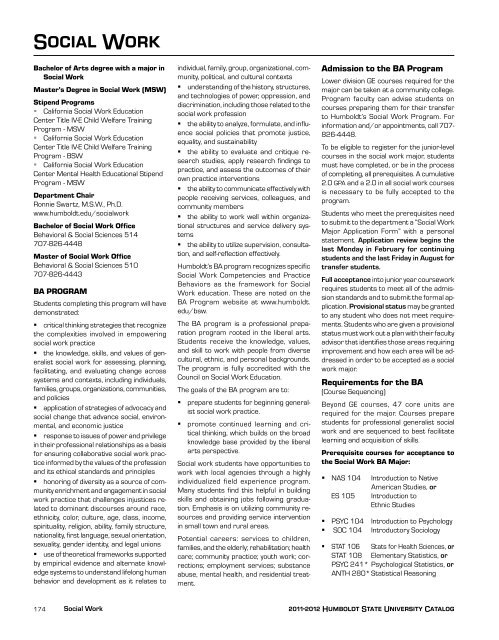2011-12 Academic Year - Bad Request - Humboldt State University
2011-12 Academic Year - Bad Request - Humboldt State University
2011-12 Academic Year - Bad Request - Humboldt State University
Create successful ePaper yourself
Turn your PDF publications into a flip-book with our unique Google optimized e-Paper software.
Social Work<br />
Bachelor of Arts degree with a major in<br />
Social Work<br />
Master’s Degree in Social Work (MSW)<br />
Stipend Programs<br />
California Social Work Education<br />
Center Title IV-E Child Welfare Training<br />
Program - MSW<br />
California Social Work Education<br />
Center Title IV-E Child Welfare Training<br />
Program - BSW<br />
California Social Work Education<br />
Center Mental Health Educational Stipend<br />
Program - MSW<br />
Department Chair<br />
Ronnie Swartz, M.S.W., Ph.D.<br />
www.humboldt.edu/socialwork<br />
Bachelor of Social Work Office<br />
Behavioral & Social Sciences 514<br />
707-826-4448<br />
Master of Social Work Office<br />
Behavioral & Social Sciences 510<br />
707-826-4443<br />
BA PROGRAM<br />
Students completing this program will have<br />
demonstrated:<br />
critical thinking strategies that recognize<br />
the complexities involved in empowering<br />
social work practice<br />
the knowledge, skills, and values of generalist<br />
social work for assessing, planning,<br />
facilitating, and evaluating change across<br />
systems and contexts, including individuals,<br />
families, groups, organizations, communities,<br />
and policies<br />
application of strategies of advocacy and<br />
social change that advance social, environmental,<br />
and economic justice<br />
response to issues of power and privilege<br />
in their professional relationships as a basis<br />
for ensuring collaborative social work practice<br />
informed by the values of the profession<br />
and its ethical standards and principles<br />
honoring of diversity as a source of community<br />
enrichment and engagement in social<br />
work practice that challenges injustices related<br />
to dominant discourses around race,<br />
ethnicity, color, culture, age, class, income,<br />
spirituality, religion, ability, family structure,<br />
nationality, first language, sexual orientation,<br />
sexuality, gender identity, and legal unions<br />
use of theoretical frameworks supported<br />
by empirical evidence and alternate knowledge<br />
systems to understand lifelong human<br />
behavior and development as it relates to<br />
individual, family, group, organizational, community,<br />
political, and cultural contexts<br />
understanding of the history, structures,<br />
and technologies of power, oppression, and<br />
discrimination, including those related to the<br />
social work profession<br />
the ability to analyze, formulate, and influence<br />
social policies that promote justice,<br />
equality, and sustainability<br />
the ability to evaluate and critique research<br />
studies, apply research findings to<br />
practice, and assess the outcomes of their<br />
own practice interventions<br />
the ability to communicate effectively with<br />
people receiving services, colleagues, and<br />
community members<br />
the ability to work well within organizational<br />
structures and service delivery systems<br />
the ability to utilize supervision, consultation,<br />
and self-reflection effectively.<br />
<strong>Humboldt</strong>’s BA program recognizes specific<br />
Social Work Competencies and Practice<br />
Behaviors as the framework for Social<br />
Work education. These are noted on the<br />
BA Program website at www.humboldt.<br />
edu/bsw.<br />
The BA program is a profession al preparation<br />
program rooted in the liberal arts.<br />
Students receive the knowledge, values,<br />
and skill to work with people from diverse<br />
cultural, ethnic, and person al backgrounds.<br />
The program is fully ac credited with the<br />
Council on Social Work Education.<br />
The goals of the BA program are to:<br />
prepare students for beginning generalist<br />
social work practice.<br />
promote continued learning and critical<br />
thinking, which builds on the broad<br />
knowledge base provided by the liberal<br />
arts perspective.<br />
Social work students have opportunities to<br />
work with local agencies through a highly<br />
individualized field experience program.<br />
Many students find this helpful in building<br />
skills and obtaining jobs following graduation.<br />
Emphasis is on utilizing community resources<br />
and providing service intervention<br />
in small town and rural areas.<br />
Potential careers: services to children,<br />
families, and the elderly; rehabilitation; health<br />
care; community practice; youth work; corrections;<br />
employment services; substance<br />
abuse, mental health, and residential treatment.<br />
Admission to the BA Program<br />
Lower division GE courses required for the<br />
major can be taken at a community college.<br />
Program faculty can advise students on<br />
courses preparing them for their transfer<br />
to <strong>Humboldt</strong>’s Social Work Program. For<br />
information and/or appointments, call 707-<br />
826-4448.<br />
To be eligible to register for the junior-level<br />
courses in the social work major, students<br />
must have completed, or be in the process<br />
of completing, all prerequisites. A cumulative<br />
2.0 GPA and a 2.0 in all social work courses<br />
is necessary to be fully accepted to the<br />
program.<br />
Students who meet the prerequisites need<br />
to submit to the department a “Social Work<br />
Major Application Form” with a personal<br />
statement. Application review begins the<br />
last Monday in February for continuing<br />
students and the last Friday in August for<br />
transfer students.<br />
Full acceptance into junior year coursework<br />
requires students to meet all of the admission<br />
standards and to submit the formal application.<br />
Provisional status may be granted<br />
to any student who does not meet requirements.<br />
Students who are given a provisional<br />
status must work out a plan with their faculty<br />
advisor that identifies those areas requiring<br />
improvement and how each area will be addressed<br />
in order to be accepted as a social<br />
work major.<br />
Requirements for the BA<br />
(Course Sequencing)<br />
Beyond GE courses, 47 core units are<br />
required for the major. Courses prepare<br />
students for professional generalist social<br />
work and are sequenced to best facilitate<br />
learning and acquisition of skills.<br />
Prerequisite courses for acceptance to<br />
the Social Work BA Major:<br />
NAS 104 Introduction to Native<br />
American Studies, or<br />
ES 105 Introduction to<br />
Ethnic Studies<br />
PSYC 104 Introduction to Psychology<br />
SOC 104 Introductory Sociology<br />
STAT 106 Stats for Health Sciences, or<br />
STAT 108 Elementary Statistics, or<br />
PSYC 241* Psychological Statistics, or<br />
ANTH 280* Statistical Reasoning<br />
174 Social Work<br />
<strong>2011</strong>-20<strong>12</strong> <strong>Humboldt</strong> <strong>State</strong> <strong>University</strong> Catalog

















